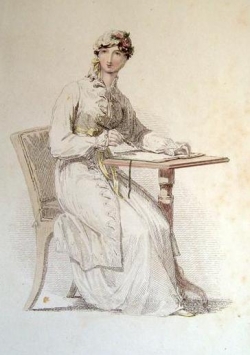 I’m going to be teaching a workshop soon on this because it’s something I see in a lot of contest manuscripts–there’s a good start and then the synopsis slips into cliches or takes a left into what comes across as a contrived plot. This comes from forcing a set plot onto the characters instead of developing characters that bring their own conflicts and issues to the party.
I’m going to be teaching a workshop soon on this because it’s something I see in a lot of contest manuscripts–there’s a good start and then the synopsis slips into cliches or takes a left into what comes across as a contrived plot. This comes from forcing a set plot onto the characters instead of developing characters that bring their own conflicts and issues to the party.
Robert McKee who teaches one of the best classes there is on story structure states: story is character and character is story—if you change the story you must change your characters and if you change your characters your story will change.
What this means is that if you approach the plot (the things that happen) from the aspect of forcing certain actions to happen, you’re going to end up with a contrived story—the reader won’t believe the events because they are forced onto the characters. This is where you end up with the heroine kidnapped because she does something stupid, or the hero believes his girl is cheating on him just because he sees her with another guy, or some other external events forces the characters to do stupid things that really don’t match the character’s character.
To avoid this, you look for the story to come from the characters—you set up your characters to generate the plot (the things that happen) because the characters make choices. Those choices have consequences that generate new problems and the need for new choices.
So, how, exactly, do you go about doing this?
1. Start at the deepest point: for every character, find that person’s core need. (And, yes, you need to do this for all your characters, good guys and bad, and secondary characters, too.) Know what every character wants most in this life.
2. Find out why that character needs that one thing. When looking for these motivations for a character’s core need, discard the first two or three ideas. And look for motivations that happen early in life—we’re all shaped most strongly by those things that happen in our formative years.
3. In a romance, set up a potential mate who can’t provide that need for your main character (and know who really is the main character in the story).
4. Decide if your characters recognize their needs and motivations.
5. Go beyond he’s hot and she’s sexy for characters to click emotionally, mentally, and on levels beyond physical.
6. Layer. Add traits that are strengths and ones that are weaknesses, make them compliment and contrast.
7. Give every character a secret. Maybe even one that stays hidden in that story.
8. Focus the story on one character’s specific growth—that is your protagonist, and that person’s growth is at the heart of the book. Yes, in a romance you have a hero and a heroine, but one of them needs to be the main focus.
9. Put in clear, specific goals for each character. Avoid negative goals (she wants to avoid being killed)—the reader won’t know if the character archives this goal since it’s an avoidance goal. And make it tangible—a goal to be rich doesn’t mean much since one person’s rich might be a thousand dollars while another’s is a hundred million. In every scene, every character needs a goal. And your characters need a specific, tangible goal that sets the story into action.
10. Make sure every choice (and every failure) has consequences. It’s no good having a character whose goal is a “so what” goal. The character’s life, or at least their image of themselves, should be on the line. If the hero doesn’t get that promotion, he’s got to lose his wife, his home, and never be able to work in that profession again. If the heroine doesn’t find the three hundred dollars to keep her car, she should lose her child because she can’t keep a job and keep food on the table. There have to be costs for failure, otherwise why should the reader care.
Finally, if you get stuck for what happens next, go back to your characters and play the “what if” game with them. Look at throwing more obstacles at your character—how will that person react to this new problem? For example, if your heroine has to get a contract signed to get that promotion to VP to be able to afford the medical bills for her mother’s cancer, what if she finds out the contract is with a mobster? Is she still going to go for it? Or what if the guy does sign—and then shows up dead the next day? What does she do now? Or what if in the middle of the business meeting, she has an asthma attack? How will she handle that?
Look for how to make things worse for your characters—but always look at the story evolving from your characters reactions to those obstacles. Instead of thinking, “Oh, and then this will happen in the story and my character will do that.” Go for thinking, “What if this happens—how would I react to that if I were this person?” And let your story evolve from your characters so that your story is really about your characters, and your characters are your story.
And if you need to know more (or put this into practice), come and take the workshop–we’ll do some hands-on work with this.
